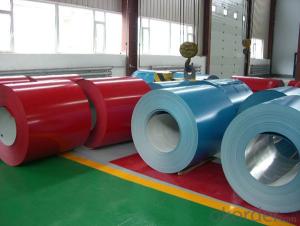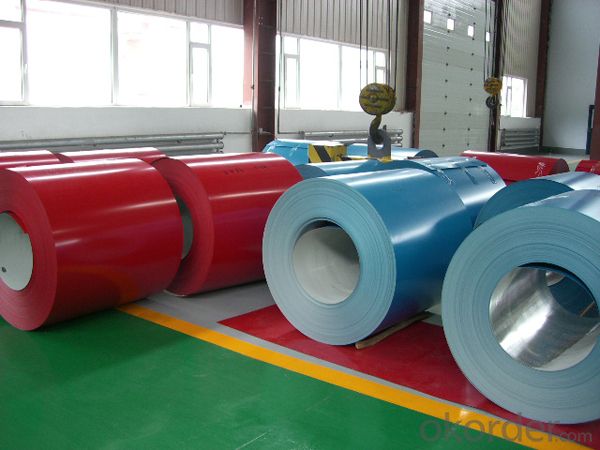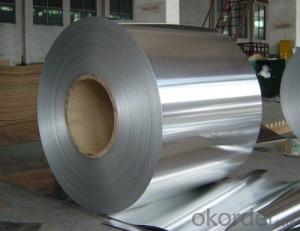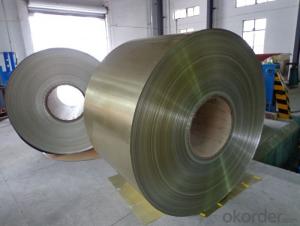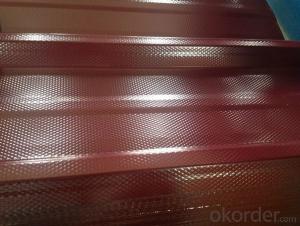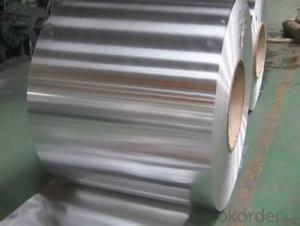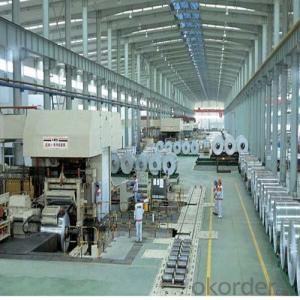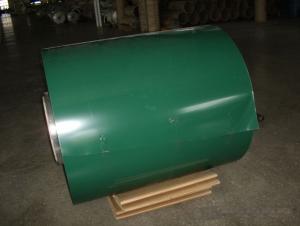Palatiuzed Aluminum Coils for Color Coated Aluminum Roll in Cladding Panels
- Loading Port:
- Shanghai
- Payment Terms:
- TT OR LC
- Min Order Qty:
- 5 m.t.
- Supply Capability:
- 50000 m.t./month
OKorder Service Pledge
OKorder Financial Service
You Might Also Like
Specification
Color Coated Aluminium Roll For Aluminium Cladding Panel
Specifications
Grade | 1050,1060,1070, 1100, 1200, 2024,3003, 3004,3005, 3105, 5005,5052 5182,5754,8011 etc |
Thickness | 0.1~1.5mm |
Width | 100~2500mm |
Surface Treatment | PVDF and PE coated |
Temper | O-H112 |
Hardness | More than 2H |
Yield(≥MPa) | 160 |
Ultimate Strength(≥MPa) | 175 |
Elongation(≥%) | 6 |
Packing Material | Moisture-proof agent, steel tape bundle, wooden pallet, brown paper |
Method | Vertical(eye to sky) or horizontal(eye to wall) |
Standard Specification | 1000mm×C, 1200mm×C, etc |
Shipping | Container Loading or Bulk Pack |
Characteristics
1) Excellent weather-proof durability
2) Anti-ultraviolet
3) High erosion resistance
4) Stable color and gloss
5) Good mechanical processing performance
6) Abrasion resistance
7) Anti-impact
8) High flexibility
Application
1) Construction material further processing
2) Solar cell frame, solar battery frame
3) Glass curtain wall frame
4) Interior decoration
5) Elevator decoration
6) Signs, nameplate, bags making.
7) Automobile parts material
8) Office and Household appliances: HVAC equipments
9) The consumer electronics: mobile phones, digital cameras, MP3 .etc.
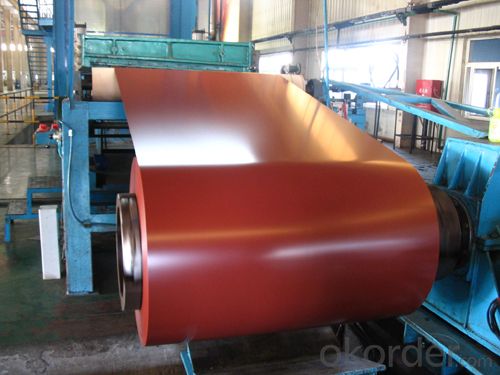
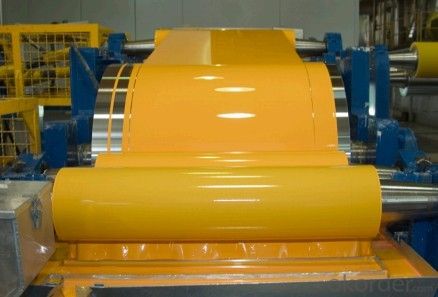
Coating varieties
Polyester Coatings (PE)
PE (polyester) coatings exhibit an excellent combination of hardness, flexibility, flow, appearance, and superior resistance to dirt retention in indoor and outdoor applications. These coatings are highly resistant to abrasion, metal marking, staining, and marring, and require minimal maintenance. Glazetech uses polyester paints which provide excellent colour and gloss retention properties.
Polyvinylidene Fluoride Coatings (PVDF)
PVDF (polyvinylidene fluoride) is a chemical resistant thick film barrier coating commonly used in architectural applications where both excellent appearance and substrate protection must be maintained over a long period of time. This coating is unaffected by most chemicals and solvents and has excellent wear and abrasion resistance. PVDF also has a high dielectric strength, excellent resistance to weathering and the ability to self extinguish.
FAQ
--Q: Do you provide free samples?
--A: Yes, free samples will be sent to you on freight at destination.
--Q: Can I get your latest products catalogue?
--A: Yes, it will be sent to you in no time.
--Q: What is the MOQ?
--A: 2 tons
--Q: What are your payment terms?
--A: We accept L/C, T/T.
--Q: What kinds of alloy can you supply?
--A: 1000 series: 1050, 1060, 1070, 1100, 1145, 1200
3000 series: 3003, 3004, 3105, 3104
5000 series: 5052, 5083, 5754, 5182
6000 series: 6061, 6063, 6062, 6063
8000 series: 8011, 8021
--Q: What’s the coating of top side?
--A: PVDF and PE coating
--Q: What kinds of temper can you supply?
--A: O-H112: O,H12,H14,H16,H18,H22,H24,H26,H,32,H34,H111,H112, T3, T4, T6
- Q: How do aluminum coils contribute to sustainability efforts?
- Due to the numerous environmental benefits they offer, aluminum coils play a significant role in sustainability efforts. Firstly, aluminum is a material that can be recycled easily, with almost 75% of all aluminum ever produced still being used today. This means that aluminum coils can be recycled and reused indefinitely without losing their original properties, resulting in significant energy savings and reduced greenhouse gas emissions compared to the production of new aluminum. Moreover, the recycling process of aluminum coils requires only 5% of the energy needed to produce new aluminum from raw materials. This not only saves valuable resources, but also reduces the extraction and processing of bauxite ore, the primary source of aluminum, which can have detrimental effects on the environment. Additionally, aluminum coils are both lightweight and durable, making them an excellent choice for various applications in industries like automotive, construction, and packaging. Their lightweight nature reduces fuel consumption during transportation, leading to lower carbon emissions. Furthermore, their durability ensures a longer lifespan, reducing the need for frequent replacements and minimizing waste generation. The use of aluminum coils also contributes to sustainable building practices. Aluminum is resistant to corrosion, making it suitable for exterior applications and reducing maintenance requirements. Additionally, it can be easily integrated into energy-efficient building systems, such as reflective roofing, which helps reduce energy consumption and mitigate the urban heat island effect. In conclusion, aluminum coils contribute to sustainability efforts through their recyclability, energy efficiency in production and recycling, lightweight nature, durability, and suitability for various sustainable applications. By choosing aluminum coils, industries and individuals can actively participate in promoting a circular economy and reducing their environmental impact.
- Q: 0.6mm insulation aluminum coil price insulation aluminum coil where to buy the most assured?
- If the surface of the aluminum color, it is directly on the Internet search color coated aluminum roll can be. Best site inspection, and now more factories, quality uneven
- Q: What are the necessary safety measures to take when handling aluminum oxide coated aluminum coils?
- <p>When working with aluminum oxide coating on aluminum coils, it's crucial to follow safety precautions. Always wear appropriate personal protective equipment (PPE), including gloves, safety glasses, and a dust mask to prevent inhalation of dust particles. Ensure proper ventilation to avoid dust accumulation. Handle the material carefully to prevent any skin contact with the coating. Keep the area clean and free from any flammable materials to avoid fire hazards. Be aware of the specific health risks associated with aluminum oxide exposure, and follow the manufacturer's guidelines for safe handling. Regularly inspect equipment for any signs of wear or damage that could lead to accidents.</p>
- Q: Can aluminum coils withstand high temperatures?
- High temperatures are easily withstood by aluminum coils. With a melting point of around 660 degrees Celsius (1220 degrees Fahrenheit), aluminum possesses a relatively high melting point. Consequently, it becomes a suitable choice for applications in high-temperature environments. Moreover, the exceptional thermal conductivity of aluminum facilitates efficient heat dissipation. Due to this characteristic, aluminum coils frequently find application in heat exchangers and diverse heating applications. Nevertheless, it is crucial to acknowledge that the temperature limit for aluminum coils may differ depending on the specific alloy and application.
- Q: How are aluminum coils tested for surface roughness?
- Various methods are employed to test the surface roughness of aluminum coils, guaranteeing that they meet the necessary quality standards. One frequently utilized technique involves the utilization of a surface roughness tester or profilometer. This device gauges the roughness of the coil surface by tracing a stylus or probe across it and recording the height variations. The surface roughness tester furnishes data such as Ra (average roughness), Rz (average peak-to-valley roughness), and Rt (total height roughness). These parameters aid in evaluating the surface quality of the aluminum coil and ascertaining whether it adheres to the desired specifications. Additionally, visual inspection is commonly performed to identify any visible defects, scratches, or irregularities on the surface. This inspection can be carried out manually by trained operators or with the assistance of automated systems that employ cameras and image analysis algorithms to detect imperfections. Another method utilized to assess surface roughness involves the use of laser scanners. These scanners emit laser beams that bounce off the surface of the aluminum coil and are subsequently measured to determine the surface profile and roughness. Laser scanners offer high-resolution, contactless measurements, rendering them highly accurate and efficient for evaluating surface roughness. All in all, a combination of surface roughness testers, visual inspection, and laser scanners are typically employed to test the surface roughness of aluminum coils, guaranteeing that they meet the necessary quality standards for diverse applications.
- Q: Is it possible to use a grinder for cutting aluminum coil?
- <p>Yes, you can use a grinder to cut aluminum coil, but it's essential to choose the right type of grinder and blade. A metal cutting grinder with a suitable blade designed for cutting aluminum is recommended. Ensure the blade is sharp and the grinder is powerful enough to handle the material. Always wear appropriate safety gear, including gloves and eye protection, as cutting aluminum can produce sharp edges and flying debris. Be cautious of the heat generated during cutting, as it can warp or damage the aluminum.</p>
- Q: What is the weight of an average aluminum coil?
- The weight of an average aluminum coil can vary depending on its dimensions and thickness. However, a typical aluminum coil can weigh anywhere between 1,000 to 10,000 pounds (450 to 4,500 kilograms).
- Q: Can aluminum coils be used in automotive applications?
- Automotive applications can indeed utilize aluminum coils. Given their lightweight nature, aluminum coils prove to be an exceptional option for automotive manufacturers, aiding in the reduction of overall vehicle weight. Consequently, this reduction can lead to enhanced fuel efficiency and performance. In addition, the outstanding heat conductivity of aluminum coils becomes indispensable in automotive applications, particularly when it comes to heat dissipation. Furthermore, the commendable corrosion resistance of aluminum coils proves to be highly advantageous in automotive applications, specifically when vehicles are exposed to diverse weather conditions and road salts. All in all, the utilization of aluminum coils in automotive applications offers numerous benefits, including weight reduction, improved fuel efficiency, superior heat dissipation, and enhanced corrosion resistance.
- Q: How are aluminum coils protected against corrosion during storage?
- Aluminum coils are protected against corrosion during storage through various methods and precautions. One common method is the application of a protective coating or film on the surface of the coils. This coating acts as a barrier, preventing moisture and oxygen from coming into direct contact with the aluminum, which helps to prevent corrosion. Another method is the use of desiccants or moisture-absorbing materials. These materials are often placed inside the packaging or storage containers with the aluminum coils to absorb any moisture that may be present. By reducing the moisture content in the storage environment, the risk of corrosion is significantly minimized. In addition, proper storage conditions play a crucial role in protecting aluminum coils against corrosion. Storing the coils in a dry, well-ventilated area away from direct sunlight and other sources of moisture is essential. It is also important to ensure that the coils are stored off the ground and away from any chemicals or substances that could potentially cause corrosion. Regular inspections and maintenance are also necessary to prevent corrosion during storage. This includes checking for any signs of damage or wear on the protective coating and promptly addressing any issues that may arise. Additionally, maintaining a clean storage environment free from dust, dirt, and other contaminants will help in preserving the integrity of the protective coating and preventing corrosion. Overall, a combination of protective coatings, moisture-absorbing materials, proper storage conditions, and regular maintenance is essential for effectively protecting aluminum coils against corrosion during storage. These measures help to ensure that the coils remain in optimal condition and are ready for use when needed.
- Q: Are there any limitations or drawbacks of using aluminum coils?
- There exist certain limitations and drawbacks regarding the utilization of aluminum coils. To begin with, one limitation is the higher cost of aluminum coils compared to alternative coil materials, such as copper. This disparity in cost can result in reduced cost-effectiveness, especially when large quantities of coils are necessary. Another drawback is that aluminum coils exhibit lower thermal conductivity in comparison to copper coils. Consequently, the transfer of heat may not be as efficient, ultimately impacting the overall system performance. In instances where heat transfer is of utmost importance, copper coils may be the preferred option. Furthermore, aluminum is more susceptible to corrosion in contrast to other metals. Although aluminum coils are typically coated or treated to enhance corrosion resistance, they can still be vulnerable to damage in harsh environments or if the coating is compromised. This can lead to diminished efficiency and a shorter lifespan for the coils. Moreover, aluminum coils may not be suitable for certain applications that require high strength or durability. Due to its relatively soft nature, aluminum may not effectively withstand heavy loads or extreme conditions as other materials would. Lastly, repairing or replacing aluminum coils can be more challenging compared to other coil types. The unique properties of aluminum necessitate the utilization of specialized tools and techniques, consequently adding to the overall complexity and cost of maintenance or repairs. In conclusion, while aluminum coils possess advantages, it is crucial to consider these limitations and drawbacks when selecting the appropriate coil material for a specific application.
Send your message to us
Palatiuzed Aluminum Coils for Color Coated Aluminum Roll in Cladding Panels
- Loading Port:
- Shanghai
- Payment Terms:
- TT OR LC
- Min Order Qty:
- 5 m.t.
- Supply Capability:
- 50000 m.t./month
OKorder Service Pledge
OKorder Financial Service
Similar products
Hot products
Hot Searches
Related keywords
